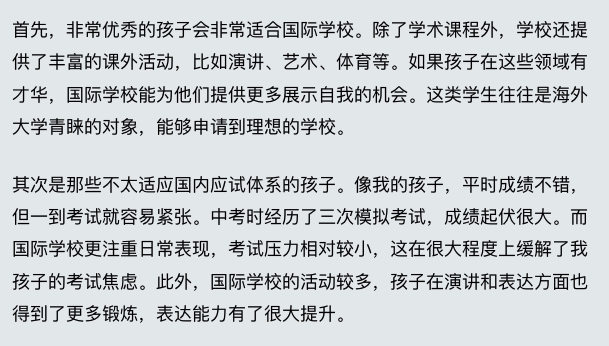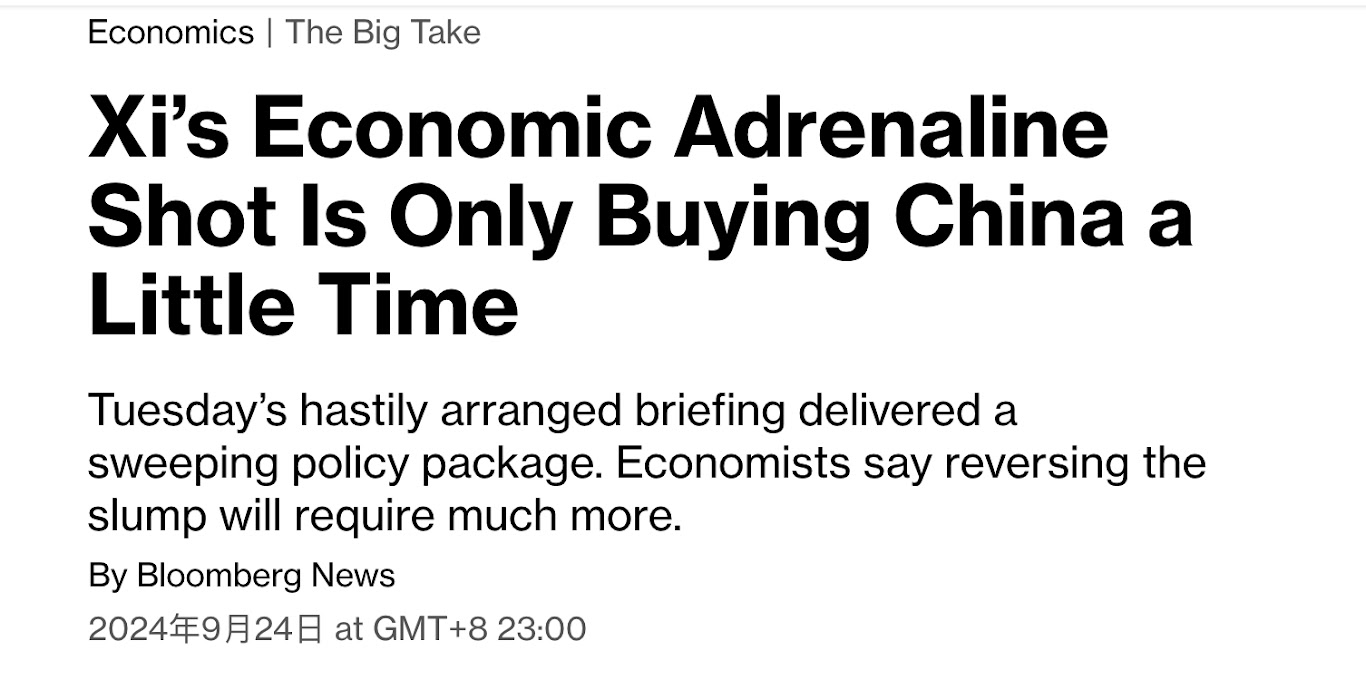Hello everyone! Today I read an article online titled "The Middle Class is Fleeing International Schools? . As a parent who has experienced international schools first hand, I think there are many reasons for the decline in students. Today, I'm going to talk to you about my opinion and also offer some advice to parents who are planning to enroll their children in international schools.
Our children have been attending international schools since elementary school, but the initial choice was not initiated by us as we did not have a local hukou, nor could we afford to purchase an enrollment-ready school house for our children in advance. With that, almost all public elementary schools closed their doors to us. So we had to send our child to an international school. As time went by, the child gradually adapted to this mode of teaching, and we did not change schools in middle school. Although our child was admitted to a public high school in the midterm, our family decided to choose international high school education after careful consideration.
First of all, international schools have really changed a lot in the past few years, especially after the epidemic, when the number of foreign teachers dropped significantly. According to customs data, the number of foreigners entering China has not yet recovered to the level before the epidemic. In addition, attacks against foreign teachers, such as the one that occurred in Jilin, have caused many foreign teachers to choose to return to their home countries after the expiration of their contracts, rather than remain in China to teach. In this case, it is also common for international schools to compete with each other for foreign teachers. As an example, before the epidemic, the percentage of foreign teachers in our children's school was as high as 90%, but what about now? Although officially it is 70%, the actual feeling may not even be 50%! This is not just a change in numbers, the weakening of the teaching force has a very direct impact on the quality of teaching, and the children's learning environment has also suffered a considerable impact.
Secondly, the phenomenon of downgrading consumption is also very obvious. There are many classmates around our children who have had to change schools and leave because of the failure of their family business or increased financial pressure. These changes have forced us parents to consider our children's educational choices more carefully.
In addition, there is often a big gap between the publicity of domestic international schools and the actual situation, once you choose the wrong one, the loss is not only money, more serious is the child can not make up for the precious time. This also makes a lot of parents to take the attitude of "rather conservative than choose the wrong", choose to let their children read the domestic high school with training institutions, or enter the public high school international classes.
The pressures faced by students and parents upon entering an international school are not insignificant. For children, the pressure of adapting to a new learning environment, learning in a foreign language, and a heavy load of extracurricular activities is obvious. For parents, in addition to the high tuition fees, there are also many "invisible" expenses, such as off-campus training, study abroad applications and other costs.
Many international schools always take graduates who have successfully applied to top schools as their model, as if not entering a Top 10 or Top 30 university is considered a failure, which inadvertently increases the pressure on children and parents. Top international schools not only value academic performance, but also emphasize the overall development of students. One parent I know has invested more than 2 million dollars in her child's application to a top American school, including participating in various competitions and filming short dramas to improve her child's overall quality.
In this atmosphere, the pressure to study abroad not only comes from the child's academics, but also permeates the psyche of the parents, creating a competitive environment that is difficult to escape.
Based on my experience, I would like to give some advice to parents who are considering choosing an international school:
- What kind of child is suitable for choosing an international school?
First of all, the very best children will be a great fit for an international school. In addition to the academic program, the school offers a wealth of extracurricular activities such as speech, art, and sports. If a child is talented in these areas, an international school can provide them with more opportunities to showcase themselves. These students are often favored by overseas universities and are able to apply to the desired schools.
The second are those children who are not well adapted to the domestic test-taking system. Like my child, he usually gets good grades, but when it comes to exams, he tends to get nervous. He went through three mock exams in the midterm, and his grades fluctuated a lot. International schools emphasize more on daily performance, and the pressure of exams is relatively low, which relieves my child's exam anxiety to a large extent. In addition, international schools have more activities, and my child has gotten more practice in speech and expression, and his ability to express himself has been greatly improved.
2. Why is financial planning critical?
After choosing an international school, many of them do not have a domestic high school registration, which means that the child must be firmly committed to an internationalized educational path. This is not just a matter of tuition fees, but also international education expenses for the next 3 to 4 years, or even longer. Many parents think they can rely on their current income to cover future education expenses, but the truth is that you must prepare enough money in advance as a backup to avoid realizing halfway through the process that you don't have enough money, which will irrevocably affect your child's education.
Also.Abandonment of over-reliance on real estateIt is also very crucial. In the past, many parents felt that they could pay for their children's study abroad by selling their homes, and some even thought that they could sell another suite if their children went to graduate school in the future. However, with the volatility of the real estate market, such plans have become increasingly impractical. There are parents around me who invested in real estate by leveraging up in China and in Hainan and Xiamen, and as a result, they now have to adjust their children's study abroad plans and opt for domestic entrance exams instead. Therefore, it is crucial to make sound financial preparations for future education planning that should not rely on real estate realizations, especially with the increased market uncertainty.
3. Valuing children's mental health
Children in international schools are usually required to live in the school, which puts higher demands on the parent-child relationship. Parents must avoid simply pushing their children roughly and must maintain good communication to understand their psychological state. The mental health of children is especially important at this stage. Many children develop anxiety and even psychological problems after going abroad because of the enormous pressure they face alone. There was a Chinese student in my child's class who suffered from severe depression and eventually had to take a break from school. Therefore, when facing the pressure of a new environment abroad, it is especially crucial to have a healthy mind and good family relationships. It is the joint support of parents and children that can help them cope and resolve any psychological problems that may arise.
4. Rational choice of schools and professions
When choosing a school, do not blindly pursue the ranking of famous schools, but pay more attention to the actual strength of the school in academic and professional fields. If your child is interested in a certain field, such as computers, then choose a school that has an advantage in that field; but if your child doesn't like it, forcing them to study won't yield good results. Foreign universities, especially science and engineering programs, are very stressful, and many Chinese students change their majors in the middle of their studies as a result. Therefore, when choosing schools and majors, the most important thing is to respect your child's interests and adaptability, rather than just pursuing the aura of a famous school.











